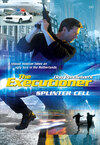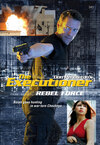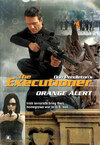Kitabı oku: «Jungle Justice», sayfa 3
It was peculiar, Bolan thought, that no official source kept track of government employees murdered by a bandit on the prowl, but numbers didn’t really matter in the last analysis. Naraka was a dangerous opponent, and he’d moved from killing local lawmen to murdering U.S. diplomats.
Bolan assumed the Langley snatch had been a one-time thing, impulsive, maybe even carried out by a subordinate without Naraka’s prior knowledge. It made no difference, though, because Naraka had a lifelong pattern of internalizing and repeating bad behavior. If he’d been apprehended for his first known homicide, it might’ve made a difference. But as it was…
Naraka might be something of a folk hero to rural villagers, who welcomed charity and anyone who helped remove the threat of tigers from their dreary lives, but he still qualified as a mass murderer—perhaps the worst in India since British troops suppressed the thugee cult during the nineteenth century. If Bolan could supply the final chapter to Naraka’s long and cruel career, so much the better.
“He’s a tough one,” Bolan told Brognola. “Knows the ground like Jungle Jim. It won’t be easy to find him, and even then—”
“You’ve tackled worse,” Brognola said.
“Maybe.” Bolan handed back Naraka’s file. “Just let me check the ground.”
It was the worst of both worlds—first, a teeming city, second largest in the country, steeped in grinding poverty, then swamps and jungles rivaling the thickest, least hospitable on Earth. The Sundarbans, where Bolan would be forced to hunt Naraka if he couldn’t catch his target in Calcutta, spanned 2,560 square miles in West Bengal, with more sprawling across the border into Bangladesh. The Indian portion included a 1,550-square-mile game preserve, where three hundred tigers were protected by law, since the early 1970s.
Nor did the Sundarbans consist of any ordinary jungle. Seventy percent of the region lay under salt water, comprising the world’s largest mangrove swamp, crisscrossed by hundreds of creeks and tributaries feeding three large rivers—the Brahmaputra, the Ganges and the Meghna. Access to much of the region was boats only, and if tigers missed a visitor on land, the tourist still had to watch out for sharks and salt-water crocodiles. Electrified dummies had failed to discourage the cats, and every tourist party that entered the Sundarbans traveled with armed guards.
All that, before poachers and bandits were added to the mix.
“Sounds like malaria country,” Bolan said.
“I’ve got a medic on standby to update your shots,” Brognola answered.
“Thoughtful to a fault.”
“That’s me.”
“All right,” the Executioner replied. “I’m in.”
4
Calcutta
The cab dropped Bolan and Takeri two blocks north of Bolan’s hotel and they walked back through the darkness, alert for any sign of followers. Spotting none, they entered the lobby, where the night clerk shot a glance at them, suspicious, then ignored them after recognizing Bolan.
Takeri started toward the creaky elevator, but Bolan stopped him with a word and steered him toward the stairs. If anything had soured since he’d left the place that evening, Bolan didn’t want to meet new adversaries for the first time when the elevator’s door jerked open and the hostiles blazed away at point-blank range.
It proved to be a wasted effort, if security precautions could be wasted in a combat zone. No enemies were waiting for them on the third floor, none in Bolan’s room after he used his key and cleared the threshold in a rush, pistol in hand. The exercise did not make him feel foolish, even so.
Better to be alive and taking too much care than to relax and die.
When they were safely locked inside the room, lights on and curtains drawn, Bolan repeated his original question. “All right, we’re off the streets. Now fill me in on who we’re running from.”
Takeri found a seat and filled it, stretching in an effort to relax. “You understand I cannot be precisely sure. I did not recognize those men.”
“Best guess?”
“It was the first direct attempt upon my life since I left military service. I have enemies, of course, but in the circumstances I assume it was related to your mission.”
“Break it down.”
“Sorry? Oh, yes, I see. In preparation for your coming, I initiated certain contacts. Seeking information on Balahadra Naraka and his associates, attempting to identify his local contacts, vendors and the like. I exercised the utmost caution, but—”
“You tripped some wires, regardless,” Bolan finished for him.
“It is possible,” Takeri answered ruefully. “The other possibility, revenge for some work previously done, strikes me as too coincidental at the present time.”
“Agreed.”
It was a poor beginning to the mission, with his guide and contact compromised, already hunted by the enemy. Bolan had been sucked into the violence, seen by the enemy, and might have sacrificed the critical advantage of surprise.
Or, maybe not.
“You need to lay out everything you’ve done,” he told Takeri. “Everyone you’ve spoken to about Naraka, when and where. If we can figure out who’s hunting you, it tells us which direction we should go to minimize exposure.”
“Certainly.” Takeri frowned. “But, everyone?”
“In order, if you can,” Bolan replied. “We’ve got all night.”
“Do we have coffee?”
Bolan made a call to room service, then settled in to listen while they waited for the coffee to arrive.
“I started with police contacts,” Takeri said. “A Captain Gupta in Calcutta, who collaborates with agents from the Ministry of the Interior to curb the traffic in endangered species and their relics.”
“Is he straight?” Bolan asked.
“Meaning honest?”
“That’s my meaning.”
“I believe so,” Takeri said. “His promotion came through merit, based on his arrests of poachers and their contacts in the export trade. Over the past three years, he has maintained an average of three arrests per week.”
“How many were convicted?” Bolan asked.
Takeri shrugged at that. “I’ve no idea. Is it important that we know?”
“Where I come from,” Bolan replied, “it’s not unusual for crooked cops to make a lot of busywork arrests that go nowhere. They pick up prostitutes and small-time dealers, run them through the system to compile a quota of arrests and bag their commendations, while the courts dish out probation and small fines. Meanwhile, the cops draw paychecks from both sides, and business continues as usual.”
“I see,” Takeri said. “Of course we have such officers in India, as well. But I do not think that Gupta stands among them.”
“Based on what?”
“His reputation. While I’ve told you his promotion came through merit, I should first have mentioned that it had been long delayed, apparently by his refusal to participate in—what is the expression? Office politics?”
Bolan felt better. “Okay, then. What did he give you?”
“Names and addresses of dealers known or thought to traffic in the sort of merchandise Naraka normally supplies. You understand that it is not all tiger pelts and ivory?”
“I got the briefing,” Bolan said. “Weird mumbo-jumbo medicine.”
“To you and I, of course,” Takeri answered. “But to millions in the East, such items are believed to be extremely potent—as their purchasers would hope to be. The so-called medicine concocted from these outlawed items has been used throughout Asia for several thousand years.”
“And no one’s noticed that it isn’t working?” Bolan asked.
“Perhaps it does work, Mr. Cooper, for selected devotees. In the Caribbean and parts of the United States, you have practitioners of voodoo, yes?”
“That’s right.”
“In Africa and parts of South America, cults practice human sacrifice this very day.”
“I wouldn’t rule it out,” Bolan replied.
“Belief,” Takeri said. “It has great power, even though skeptics deny it. When your faith healers perform on television, many people laugh, dismiss it as a fraud, and change the channel, yes? But millions more believe. And who’s to say that none is truly healed?”
“All right,” Bolan said, “let’s assume that eating tiger organs makes some old man happy in the sack. I wasn’t sent to analyze folk medicine or magic. Let’s cut to the chase.”
“I am attempting to explain,” Takeri said, “that some of those with whom Naraka deals are men of faith. They’ll never give him up. I have a list of six or seven names but have not pressed them, knowing it would be a waste of time.”
“Who have you pressed?” Bolan asked.
“I made inquiries with two dealers in Calcutta whom Captain Gupta identified as covert traffickers in tiger pelts and ivory. Posing as a potential buyer, I approached them and was courteously told that while such items sometimes come on offer from the hinterlands, it is illegal to purchase or sell them. The problem, I suspect, lies in the fact that I am native to the area, while nearly all the traffic in such items flows to foreign dealers.”
“So, you struck out with the vendors,” Bolan said.
“Correct.”
“And underneath that courtesy, did either one of them smell like a murderer?”
“In my assessment, no.”
“We’re getting nowhere,” Bolan said.
“I must confess some disappointment in my progress, to that point,” Takeri admitted. “But I did not grow discouraged. If the dealers would not speak to me, I thought, perhaps I could get through to someone else.”
“Such as?”
“Illicit trade of any kind requires protection. Captain Gupta let me have another name.”
“I’m listening,” the Executioner replied.
Takeri studied the American, impressed by his intensity, his bearing and the way he had performed during their skirmish with the assassins on the street. The man who called himself Matt Cooper seemed a worthy ally, and the CIA was paying for Takeri’s services—but it was still a risky business, as had recently been demonstrated by the rude attempt upon his life.
“Girish Vyasa,” he replied after a moment’s hesitation. “He is a customs agent. As you know, cooperation from the Customs Service is essential to the foreign trade in contraband.”
“Of course,” Bolan agreed.
“Girish Vyasa is a man of certain appetites, the cost of which exceed his salary. Perhaps they also make him vulnerable to extortion. Who can say? In any case, Naraka pays him handsomely for letting certain shipments pass without detailed inspection. Others may be paying him, as well.”
“Why is Vyasa still in business if your Captain Gupta knows all this?” Bolan asked.
“It seems that Vyasa in turn is protected by men of influence in Calcutta and New Delhi. Corruption spreads. No government is perfectly immune.”
Nodding, Bolan replied, “I take it you inquired about Vyasa in more detail?”
“Certainly. And therein lies my fault, presumably. He is, as I’ve explained, protected—both officially and unofficially.”
“Someone got wise and put the hunters on your trail.”
“I must assume that is the case,” Takeri said. “If any negligence of mine has jeopardized your mission, I must now apologize.”
“We couldn’t count on cover all the way,” Bolan replied. “I would’ve liked a better lead, but we can work with this.”
Takeri frowned. “But if the hunters, as you put it, are aware of our intentions—”
“Scratch that,” Bolan interrupted. “We’ll assume they’re onto you for asking questions, but they won’t know why, or who you’re working for. They don’t know me at all, beyond a glimpse tonight, and there’s no way they have a handle on my plans.”
“Because?”
“I haven’t made plans, yet.”
Takeri’s frown deepened. “I draw no reassurance from that statement, Mr. Cooper.”
Bolan shrugged. “Don’t sweat it. Coming in, I had no fix on the best way to reach Naraka. Now I’m warming up to it.”
“You have a plan, in fact?”
“It’s coming to me. First, I need to have a word with this Vyasa character.”
“I say again, he is protected.”
“Not from me.”
The cutting edge of Bolan’s tone sent an unexpected chill rippling along Takeri’s spine.
“You would approach him directly?”
“That’s right.”
“And if he’s being watched? Guarded?”
“We’ll have to take that chance.”
Takeri’s frown deepened. “When you say ‘we’—”
“You’ll need to show me where Vyasa lives and point him out. Aside from that, I’ll need details of what your Captain Gupta has on him, what links him to Naraka. Dates, facts, figures. Anything at all to crack him open, make him feel cooperative.”
“I see.” From where Takeri sat, it was a grim vision indeed. “But once again I ask, if he is guarded?”
“We’ll see how it goes,” Bolan replied. “You did okay tonight against those cutters.”
“Still, if you had not arrived just when you did, the outcome may have been a disappointment.”
“We’ll avoid that in the future if we can.”
“If I am permitted to inquire, what are you, Mr. Cooper? Surely not an analyst.”
“I wouldn’t say that. No.”
“What, then?”
“A trouble-shooter,” the American replied. “We’ll let it go at that, if you don’t mind.”
“Of course.”
“About those details on Vyasa—”
“Captain Gupta did not favor me with all specifics of the case, you understand.”
“Just give me what you have.”
“On several occasions—five or six, I think he said—Vyasa has been seen with export dealers linked to the Naraka group. In normal circumstances, these are men Vyasa should have been investigating, possibly arresting, but he seemed to be on cordial terms with all of them. At two meetings, police observed the passage of an envelope into Vyasa’s hands.”
“Containing money?” Bolan asked.
Takeri shrugged. “Sadly, they did not stop him to inquire. There is a mystery of sorts in that respect. His bank accounts—those known to the authorities, at least—show no unusual or unexplained deposits, yet Vyasa lives beyond his means.”
“So, he’s been hiding cash somewhere.”
“Presumably.”
“Maybe we’ll shake some of it loose from him and use it on the next phase of our journey.”
“Which would be?”
“I thought you understood. I’m here to find Naraka.”
“But he almost never leaves the Sundarbans.”
“I guess that’s where we’ll find him, then,” Bolan stated.
Again, the deadly we, Takeri thought. “I should advise you, Mr. Cooper, that my personal experience in fieldwork of this sort is…limited.”
“You spent time in the military, I believe?”
Takeri masked his first rush of surprise. “That’s true.”
“And you’re my guide for the duration, yes?”
“Correct.” Takeri felt the noose settle around his neck.
“No problem, then.”
No problem. The phrase was said as if the words would not only allay Takeri’s fear but turn him into something he was not. A hunting guide, perhaps. A jungle warrior. True, he had been trained for living off the land and fighting in the wilderness, but all of that seemed long ago and far away.
“I will endeavor not to fail you, Mr. Cooper,” he replied.
“It’s Matt. And failure’s not an option.”
“This is all to do with the Americans, I take it? Those Naraka kidnapped?”
“Those he killed. That’s right.”
“If he had not involved your people—”
“Then I likely wouldn’t be here. But he did, I am and we’re together in this thing for better or worse, if you think you can handle it.”
Takeri knew he should resist the challenge, not rise to the bait, but at the moment it seemed irresistible. “I can. I will.”
“Good man. Now, what say you go on and bring me up to speed about Vyasa. I’d like to drop in for a visit tonight, and before we do that I need chapter and verse.”
Takeri had a sense that everything was happening too rapidly, that he was being swept away, but what choice did he have? His working contract with the CIA demanded full cooperation, and he’d gone so far already in the matter that his life was placed in jeopardy. Those who had tried to kill him would already have his home staked out. At least, with the American, he had a better fighting chance.
But the Sundarbans!
“All right,” Takeri said at last.
5
As they discussed their short-range plans, the Executioner took stock of Abhaya Takeri, comparing his reticence to the forceful response he’d witnessed from Takeri in the street a short time earlier.
The change was only natural, of course. When Bolan met the Indian, Takeri had been fighting for his life, with no time to reflect on the advisability of any certain move. A kill-or-be-killed situation always tested humans to the limit. Those who passed the test survived, while those who failed were meat for the machine.
During the street assault, Takeri’s military training and survival instincts had emerged to save him, with some timely help from Bolan. Whether he would have survived alone was something else, a question left unanswered for all time, but it was clear to Bolan that Takeri had the courage, strength and will to fight if motivated properly.
Sitting in the relative security of Bolan’s hotel room, Takeri had a chance to think about what he was getting into, weigh the odds against him, letting worms of doubt nibble at his resolve. He wasn’t balking yet, but Bolan knew it could happen.
Strong men could defeat themselves before a contest started by exaggerating the prospective difficulties in their minds. Some heroes, Bolan realized, were simply men who had no time to stop and think.
What soldier started his day with plans to fall on top of a grenade? Or charge the muzzle-blast of an emplaced machine gun, armed with nothing but a satchel charge? Who got up in the morning, thinking, Man, I’d love to die today?
Bolan recognized Takeri’s hesitancy and sympathized with it, but he couldn’t afford an ally who balked when the going got tough. A guide was no use if he brought up the rear.
Bolan went briskly through the plan, watching Takeri sketch a floor plan of Girish Vyasa’s large apartment house. The layout of his living space would be a mystery until they crossed the threshold, but Takeri had spotted exits, elevators, where the doorman stood, which entrances were normally unwatched.
“You’ve thought this through,” Bolan observed.
“I guessed it might be necessary to approach him,” Takeri said, “but I had no plans to go inside myself.”
“Plans change. Go with the flow.”
The smile was thin. “I’ll do my best.”
“He doesn’t have security? No bodyguards?”
Takeri shook his head. “Nothing like that. Vyasa is—or claims to be—simply a public servant. Who would wish to harm him?”
“Good,” Bolan replied. “That makes it easier.”
He spread a large map of Calcutta on the bed, smoothing its creases with his hand, and said, “Let’s plot the route and find at least one alternative in case we have to bail.”
Takeri bent over the map, peering closely at it, finally bringing an index finger to rest on the glossy paper. “We are here,” he told Bolan, “and Vyasa lives…here.”
A maze of streets some two miles wide separated Bolan’s hotel from his target. One major street cut through the heart of it, a virtual straight-line approach with minor jogs at either end. Bolan memorized the street names, thankful most of them were printed on the map in English. Then, having accomplished that, he set about selecting paths of possible retreat.
He didn’t plan to fail but knew it was always possible. They might be intercepted prior to reaching Vyasa’s apartment—by police, an unexpected bodyguard, more of the thugs who’d tried to kill Takeri earlier—and so have to abort the mission. Even at the threshold or beyond, security devices might compel a hasty exit from Vyasa’s eighth-floor flat. In that case, they’d be glad to have escape routes plotted, memorized, ready to use.
Calcutta’s teeming streets could be a help, then, if they had to fight or run. A help…or just a maze, where all roads led to death.
Bolan spent time tracing the streets, burning that section of the map into his memory. Takeri indicated certain one-way streets, others where foot traffic made passage slow or even dangerous in darkness. The nearest police substation was fifteen minutes from Vyasa’s apartment under normal nighttime driving conditions.
Bolan listened and absorbed the information, hoping it would serve him well. He needed information from Girish Vyasa, but there was a limit to his need. He wouldn’t jeopardize the innocent, and he wouldn’t fire on police officers doing their duty.
Bolan had bruised his share of lawmen, frightened some, and even helped to put a few in prison—but he wouldn’t kill an honest cop to save his own life, or Takeri’s.
A crooked customs agent, though, was a different story.
When he was finished charting streets, Bolan turned to Takeri once again and said, “Give me the rundown on Vyasa.”
“Rundown?”
“What’s he like? Describe him physically, his habits, anything you have. Fill in the blanks.”
“Of course.” Takeri closed his eyes briefly, as if reviewing data tattooed on the inside of his eyelids, then began. “He has a birthday in October, at which time he will be forty-two years old. He is five feet and seven inches tall, weighing 150 pounds. He has a small tattoo—”
“I’ll recognize him,” Bolan interrupted. “What about the rest?”
“His customs personnel file will not have the information you require,” Takeri said, “but Captain Gupta and my private observations may, as you say, fill the blanks.”
“I’m listening.”
“Vyasa is a lifelong bachelor. Women apparently hold no attraction for him. He prefers…young men.”
“I take it that’s still frowned upon in India?” Bolan asked.
“Most assuredly. It is a fact of life, perhaps, but still repressed. There is no movement here, as in America, to bring homosexuals out of the cupboard.”
“Closet,” Bolan corrected him.
“Sorry?”
“It’s not important. Go ahead.”
“Vyasa’s lifestyle has not been exposed. He would be driven from his public office if that were the case.”
“But Captain Gupta knows?”
“Of course.”
“So, why not play that card and flush him out if he’s regarded as corrupt?”
“Again, there is the matter of protection. Captain Gupta might succeed in ruining Vyasa’s reputation, but his own would also suffer.”
“From the backlash?” When Takeri only stared and frowned, Bolan revised his choice of terms. “Reprisals.”
“Ah. Exactly so. He might not be dismissed, you understand, but there are other ways to force him out. Transfers, official reprimands, demotions based on petty incidents.”
“Bureaucracy,” Bolan replied.
“The very thing.”
It was the same in every nation, Bolan supposed. Benedict Arnold had been driven to betray America, at least in part, by petty bureaucratic slights that kept him from promotion in the Continental Army. Every government employee had at least one tale of persecution to relate.
“You think Naraka may have used Vyasa’s sex life to control him?”
“With the money, which Vyasa obviously craves,” Takeri said, “it is a possibility.”
“Okay,” Bolan replied. “Let’s go and see the man.”
BOLAN’S RENTAL CAR was a four-door Skoda Octavia, a midsize Indian model in silver that looked more like battleship gray. Before leaving the hotel room, he took the Steyr AUG from its hiding place, assembled it and stowed it in a nylon tote.
Takeri watched Bolan sling the bag over his shoulder, then inquired, “Are we going to war?”
“You never know,” Bolan said. “Better safe than sorry.”
Takeri’s expression suggested that he was sorry already, but he made no comment as they rode the elevator down and crossed the lobby, turning left and passing through a narrow alley to the hotel’s small, fenced parking lot. A middle-aged attendant dressed in what appeared to be a Boy Scout uniform examined Bolan’s key, then wheeled the gate open and waved them out into the sultry night.
Bolan had left the city map behind, trusting his memory and good sense of direction to convey him through the streets. Calcutta was a crowded, often wretched city, but it was a city nonetheless. Bolan was not intimidated by its architecture, slums or residents. His focus on the mission didn’t leave him any time to dwell on the affluence or poverty surrounding him.
The drive, some two miles and a quarter, took the better part of twenty minutes, with repeated stops for traffic lights, pedestrians, rickshaws and beggars in the street. Police were not in evidence along the route, and Bolan guessed they were spread thin across the city, drawn away from traffic duty for the most part by incessant small emergencies.
Calcutta had a reputation, dating from colonial times—the infamous “Black Hole” incident that claimed British lives in 1756—to modern acts of terrorism by the United Liberation Front of Assam. Religious, caste and tribal conflicts had inflated the local death toll over time, while random murders during rapes and robberies were downplayed by the local press. Rumors of human sacrifice to Kali still persisted from Calcutta and environs, though the case had not been proved in court. Bolan had had his own experience with Kali, and it was something he’d never forget. It was impossible to calculate the missing-person statistics, when no one really knew how many people occupied the city on a given day.
How many would be dead or missing in the morning, thanks to Bolan? He could not predict a tally, hoped that he would not be forced to kill that night, but at a certain point the choice would be taken from his hands. Girish Vyasa would decide whether to balk or to cooperate. If there were watchers at his flat, unnoticed by Takeri, yet another element of risk came into play.
No matter where he went within the city, or in India at large, Bolan would stand out in the crowd. He couldn’t pass for native, and while U.S.-European types were not entirely strangers to the region, those encountered by the natives on a daily basis were predominately businessmen or tourists, with a smattering of diplomats thrown in. Bolan might pass for a tourist at first glance, but closer examination quickly gave the lie to that facade.
This night, the darkness was his friend and Abhaya Takeri was his guide. His target was a man he’d never met, who might not live to see another sunrise. Come what may, Bolan had work to do, and he would not allow himself to be diverted from the job at hand.
An ambulance came up behind them, weaving awkwardly through traffic with its siren warbling. Bolan didn’t know if it was racing to an accident or toward a hospital, already bearing victims of some private tragedy, but he slowed to let it pass. Most of the other drivers, whether on four wheels or two, clung stubbornly to their appointed lanes.
Beside him, in the shotgun seat, Bolan noticed Takeri’s sharp attention to the ambulance. No mind reader, he still had an idea of what was happening inside his contact’s head. Takeri was unsettled, naturally, by the effort to assassinate him, that anxiety exacerbated by their mission to accost Vyasa at his home. Given a choice, Takeri might have bought a ticket on the next train out of town for parts unknown, but he was sticking to the job.
So far.
Trust was a rare commodity in Bolan’s world, bestowed on those who earned it under fire. Takeri hadn’t reached that level yet, though Bolan read him as a decent man whose sense of duty kept him for the most part on the straight and narrow path.
What would he do the next time they were challenged, threatened, placed in danger?
Only time would tell.
Bolan spotted the number of Vyasa’s drab apartment house just as Takeri said, “This is the place.” He drove past and boxed the block at a crawl, scanning sidewalks for any lookouts who might be stationed among the passersby or street corner beggars. None was obvious, and so he started looking for a parking place.
In such a crowded city, space was at a premium. Curbside parking was out of the question, and the underground garage beneath Vyasa’s place required a card for passage through the roll-down gate. Reluctantly, Bolan settled for a public garage a half block farther east, taking a ticket from a stern attendant dressed in olive drab.
Using the park-and-pay garage would slow them, coming and going, but he didn’t feel like handing Takeri the keys and having him circle aimlessly while Bolan went upstairs alone. He didn’t think Takeri would bug out on him, but he was already a hunted man, and with the Steyr in the rental car it was a recipe for potential disaster.
Bolan found a spot on the garage’s third level, nosed into it and killed the engine. Unhappy with the choice, he left the Steyr in its bag, locked in the trunk.
Takeri frowned as they stepped out, and asked him, “What about the other item?”
“Circumstances alter cases,” Bolan said. “I’ll go with what I’m carrying.”
“Which is?”
“Enough to get us by, with any luck. Ready?”
Takeri shrugged. “I think the proper answer is, as ready as I’ll ever be.”
“Okay,” Bolan replied. “Let’s hope that’s good enough.”
Ücretsiz ön izlemeyi tamamladınız.

















